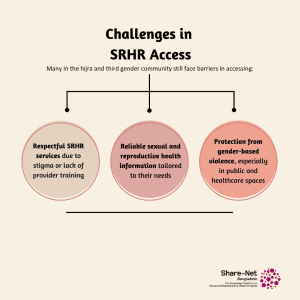Recognition Is Just the Beginning: Breaking Barriers in SRHR for Hijra and Third-Gender Communities
Tackling Stigma, Access Barriers, and Violence Through Community-Led Change
In 2013, Bangladesh made a landmark decision by officially recognising the hijra community as a third gender. This symbolic step was a critical move toward legal visibility and state acknowledgement. But recognition, while essential, is only the beginning of a longer journey toward dignity, equity, and health rights.
Despite the progress, many in the hijra and third-gender communities continue to face significant barriers in accessing sexual and reproductive health and rights (SRHR). These include widespread stigma in healthcare settings, a lack of tailored health information, and insufficient protection from gender-based violence in both public and clinical spaces.
📊 Recent findings paint a stark picture:
- 60% of hijra individuals report experiencing discrimination in public or private health facilities (Bandhu, 2022).
- 1 in 2 transgender and hijra persons avoid seeking SRHR services due to fear of stigma or mistreatment (UNDP, 2021).
- However, over 70% of hijra peer networks have been reached by community-led HIV/STI awareness initiatives, significantly improving access to information (icddr,b & Bandhu, 2020).

These statistics underscore a crucial truth: legal recognition does not automatically lead to social inclusion or health equity. Real change emerges through community-led interventions, peer-based outreach, and inclusive service delivery. Initiatives driven by organisations like Bandhu Social Welfare Society, icddr,b, and UNDP have demonstrated that trusted, culturally competent services led by the community can overcome systemic barriers where traditional institutions have lagged behind.

As we reflect on the 2025 global theme, “The Power of Communities”, the experiences of the hijra and third-gender communities in Bangladesh highlight that solidarity, shared leadership, and inclusive systems are key to making SRHR truly accessible.
🧩 Policy change opens the door — but it is the power of communities that makes inclusion real.
Sources:
- Bandhu Social Welfare Society (2022). Health and Rights of Hijra Communities in Bangladesh: Status Report.
- UNDP (2021). Hijra and Transgender SRHR Access and Stigma Report.
- icddr,b & Bandhu (2020). Peer-led HIV/STI Awareness Outcomes in Key Populations.

